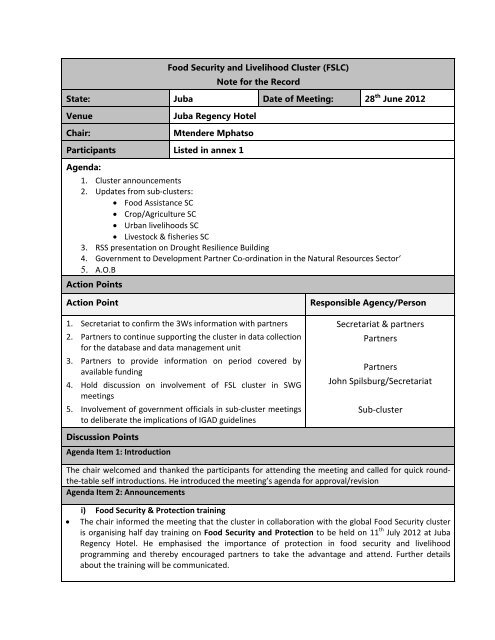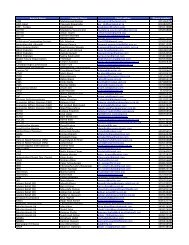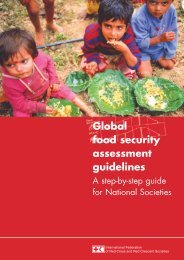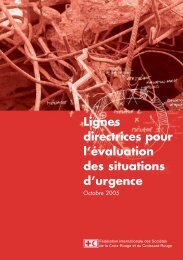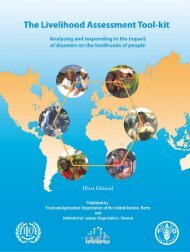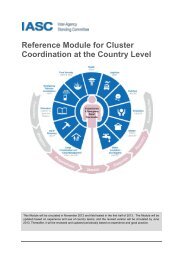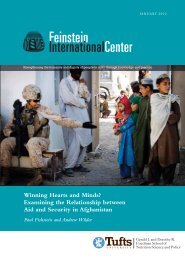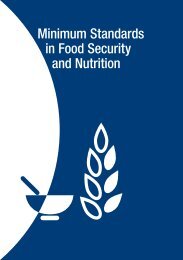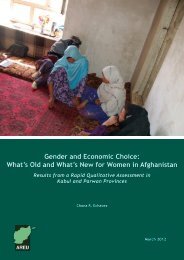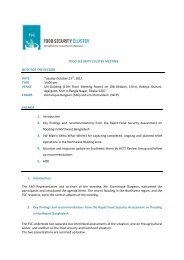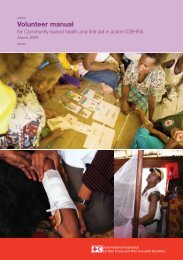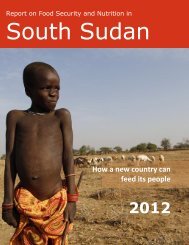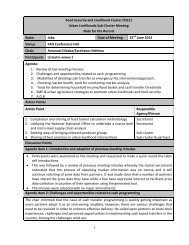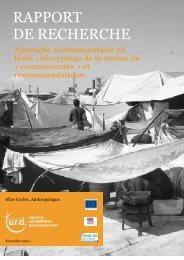FSL Monthly meeting NFRs 28th June 2012.pdf - Food Security ...
FSL Monthly meeting NFRs 28th June 2012.pdf - Food Security ...
FSL Monthly meeting NFRs 28th June 2012.pdf - Food Security ...
Create successful ePaper yourself
Turn your PDF publications into a flip-book with our unique Google optimized e-Paper software.
<strong>Food</strong> <strong>Security</strong> and Livelihood Cluster (<strong>FSL</strong>C)<br />
Note for the Record<br />
State: Juba Date of Meeting: 28 th <strong>June</strong> 2012<br />
Venue<br />
Chair:<br />
Juba Regency Hotel<br />
Mtendere Mphatso<br />
Participants Listed in annex 1<br />
Agenda:<br />
1. Cluster announcements<br />
2. Updates from sub‐clusters:<br />
• <strong>Food</strong> Assistance SC<br />
• Crop/Agriculture SC<br />
• Urban livelihoods SC<br />
• Livestock & fisheries SC<br />
3. RSS presentation on Drought Resilience Building<br />
4. Government to Development Partner Co‐ordination in the Natural Resources Sector‘<br />
5. A.O.B<br />
Action Points<br />
Action Point<br />
1. Secretariat to confirm the 3Ws information with partners<br />
2. Partners to continue supporting the cluster in data collection<br />
for the database and data management unit<br />
3. Partners to provide information on period covered by<br />
available funding<br />
4. Hold discussion on involvement of <strong>FSL</strong> cluster in SWG<br />
<strong>meeting</strong>s<br />
5. Involvement of government officials in sub‐cluster <strong>meeting</strong>s<br />
to deliberate the implications of IGAD guidelines<br />
Responsible Agency/Person<br />
Secretariat & partners<br />
Partners<br />
Partners<br />
John Spilsburg/Secretariat<br />
Sub‐cluster<br />
Discussion Points<br />
Agenda Item 1: Introduction<br />
The chair welcomed and thanked the participants for attending the <strong>meeting</strong> and called for quick roundthe‐table<br />
self introductions. He introduced the <strong>meeting</strong>’s agenda for approval/revision<br />
Agenda Item 2: Announcements<br />
i) <strong>Food</strong> <strong>Security</strong> & Protection training<br />
• The chair informed the <strong>meeting</strong> that the cluster in collaboration with the global <strong>Food</strong> <strong>Security</strong> cluster<br />
is organising half day training on <strong>Food</strong> <strong>Security</strong> and Protection to be held on 11 th July 2012 at Juba<br />
Regency Hotel. He emphasised the importance of protection in food security and livelihood<br />
programming and thereby encouraged partners to take the advantage and attend. Further details<br />
about the training will be communicated.
ii) State level IM and IPC trainings<br />
• The chair further informed that after IPC analysis conducted in April by the Livelihood Analysis Forum<br />
(LAF), a number of recommendations by the <strong>FSL</strong> cluster partners and the technical team were made<br />
among them the need to improve on the analysis units. This is in effort to enhance the use of the IPC<br />
tool in informing programming decisions. To facilitate this, LAF in collaboration with the cluster will<br />
conduct three (3) trainings in the month of July and August in Wau, Yei and Malakal in efforts to<br />
popularise the tool and create capacity in the states for future IPC analysis.<br />
• The dates for the three training will be 16 th ‐19 th July in Wau for the greater Bahr el Ghazal states; 31 st<br />
July – 3 rd Aug in Yei for the greater Equatoria and Jonglei states; and 13 th – 16 th August in Malakal<br />
catering for Upper Nile and Unity states.<br />
• The analysis and eventual IPC maps will be state based. He therefore request partners to contribute<br />
data for the states they are operating in order to facilitate the process.<br />
• Invitations to attend the trainings will be sent in due time.<br />
iii) Flood risk mapping<br />
• The wet season has started in several parts of the country and forecasts by FEWS NET over <strong>June</strong> –<br />
August period indicate high probability of rainfall above 300mm western, southern and central parts<br />
of the country; and more than 500mm in Ethiopian highlands.<br />
• Geographically, several areas of South Sudan are on the flood prone areas that received water inflows<br />
from highlands. This implies high possibilities of flooding in such areas.<br />
• Using available flooding incidence information (2007 ‐2011) the cluster generated a flood risk map to<br />
identify potential flooding areas.<br />
• In South Sudan the occurrence of floods has serious implications on food security since they hamper<br />
accessibility through roads, access to markets and cause loss of assets. Therefore partners are urged<br />
to increase their preparedness in such areas should any flooding event occur.<br />
iv) Website and Data management unit<br />
• The global <strong>Food</strong> <strong>Security</strong> Cluster has developed a website that will host webpages of countries running<br />
<strong>Food</strong> <strong>Security</strong> and Livelihood clusters. Once fully implemented the website will be used as an avenue<br />
for communication and sharing of cluster information products (maps, minutes, reports,<br />
assessment/surveys). Partners will be informed about it once it has been commissioned.<br />
• In addition, the cluster is in the process of finalizing the 3Ws database that will facilitate effective data<br />
management and faster retrieval for analysis and information generation.<br />
• At the moment the first phase of the database is nearly complete and some preliminary reporting can<br />
be generated. The second part of the database that will focus on quantities provided by partners and<br />
is being developed. The second part will be useful in strengthening the standardization of packages as<br />
previously discussed in the sub‐clusters.<br />
• The secretariat will contact each partner to ensure the validity of the 3Ws information that is being<br />
stored in the database. Hence, partners should take that opportunity to update their 3Ws accordingly.<br />
• Among the products to be generated are reports for each partner (interventions and progress) as well<br />
as summaries for appeals and interventions by states.<br />
• For effective running of the data management unit it will require partners to collaborate with the<br />
cluster in collecting the required data (market price, livestock information, and 3Ws) in their areas of<br />
operation. This will ensure availability of data and information for programming purposes.<br />
v) Funding gap<br />
• The chair mentioned that there are indications of financial challenges facing some
programs/projects leading to down scaling of planned interventions. This prompted the<br />
secretariat to send out messages requesting for information on likely time the available<br />
funding is likely to last in comparison to initial plan. The information will help understand the<br />
gaps while providing basis for advocacy. Partners should therefore take it seriously and<br />
respond soonest possible.<br />
• He shared the funding status for the current year in relation to the initial requirement of<br />
US$193M at the beginning of the year. By midyear during the CAP review the requirement<br />
increased to US$393M against total funding of US$246M. While the funding is above the<br />
193M at beginning of year it is only 61% of the current funding requirement. Moreover, the<br />
greater portion (US$233M) targets food assistance activities while only 5% (US$12M) is for<br />
livelihood activities. This will have seriously implications on resilience unless more funding is<br />
secured.<br />
• To facilitate advocacy partners should therefore respond with information on when their<br />
available funding is likely to last.<br />
Agenda Item 3: Updates from Sub-Clusters<br />
Sub‐clusters provided an overview of the main deliberations held during their monthly <strong>meeting</strong>s as<br />
follows:<br />
i) <strong>Food</strong> Assistance sub‐cluster<br />
• FSMS was on‐going and data collection was about to end. Preliminary analysis and reporting was<br />
expected to do conducted in about 10days<br />
• Preparations for the IPC state level trainings are in progress and the outcome will inform the next<br />
IPC product in August<br />
• ACF‐USA conducted nutrition causal analysis study in Aweil East county in NBeG state and results<br />
show deteriorating condition<br />
• WFP is piloting a cash transfer programme in Juba, Wau & Aweil towns targeting 68000<br />
beneficiaries and lessons learnt will inform the next phase of the project<br />
• WFP shared through a presentation its FFA strategies pointing out the principles, requirements,<br />
the process, potential activities and challenges. Suggestions were made on the need to look into<br />
technical issues such as inputs and extension; budget deficits among implementing partners; and<br />
evaluation of FFA interventions<br />
• The technical team working on indicators presented its work but it was agreed that they review<br />
the definition of FA; review the indicators in collaboration with other SC teams; and Share the<br />
findings before the next <strong>meeting</strong> in July<br />
ii) Livestock & Fisheries sub‐cluster<br />
The sub‐cluster deliberated on three main issues: 1) the sustainability of livestock supplies chain and<br />
2) transportation of drugs and vaccines, 3) LEGS training. It was agreed that:<br />
• further discussions be held on the cost recovery approach and privatization of animal health<br />
services<br />
• FAO to engage WFP more on the transportation of vaccines/drugs in the country<br />
• There is need for training in Livestock Emergency Guidelines and Standards (LEGS) for South<br />
Sudan. FAO was requested to facilitate as it has 2 TOTs. The <strong>meeting</strong> further learnt that ICRC was<br />
planning to conduct LEGS trainings in Dec 2012 targeting MARF staff
iii) Crop/Agriculture sub‐cluster<br />
The sub‐cluster dealt on seeds and tools distributions, post distribution monitoring and assessments<br />
• The progress in seeds and tools distribution varied across states with NBeG being well covered as<br />
per the plan. Nevertheless, there is an identified gap targeting 2380 households who need<br />
assistance ad tools in Aweil East and Aweil North in NBeG.<br />
• In other states Warrap was relatively better cover with 84% of planned seeds having been<br />
distributed. On average 54% of 900 Mt had been distributed<br />
State MT Enroute % In ware house % Distributed<br />
• NBELG • 183 • 0.0% • 0.0% • 100.0%<br />
• Upper Nile • 168 • 100% • 0.0% • 0.0%<br />
• Unity • 156 • 12.8% • 47.20% • 40.0%<br />
• Jonglei • 240 • 0.0% • 60.0% • 40.0%<br />
• Warrap • 72 • 0.% • 16.1% • 84.9%<br />
• Lakes • 82 • 0% • 40.0% • 60.0%<br />
• Total • 900 • 18.8% • 27.2% • 54.0%<br />
• It was revealed that distribution of seeds to Upper Nile state has been challenged by<br />
inaccessibility of roads and FAO is seeking ways on how the seeds can be transported. There were<br />
plans to transport seeds to Unity state during the week of the <strong>meeting</strong>.<br />
• To ensure that seeds and tools are distributed before the start o cropping season, FAO and the<br />
cluster should request donors to release funds early enough to allow for timely procurement and<br />
pre‐positioning<br />
• The sub‐cluster requested for information regarding seeds and tools distribution by partners not<br />
in partnership with FAO (including MoAF) in order for the sub‐cluster to fully understand the real<br />
gaps in seeds ad tools. It emerged that the Director of Extension MoAF has the distribution list<br />
used by the government and should therefore be requested to share with the sub‐cluster for<br />
updating the information.<br />
• A suggestion was made that in future seeds and tools meant for counties in upper Jonglei state be<br />
pre‐positioned in Malakal rather than Bor. This is due to proximity of Malakal to these counties<br />
which will make it easier for implementing partners to undertake secondary transportation<br />
• Output/activities monitoring sheet have been prepared and will be shared with partners<br />
• The technical team finalized on monitoring and evaluation indicators and shared with the subcluster.<br />
They will however need to be harmonized to fit in the cluster framework.<br />
• The <strong>meeting</strong> agreed there is need for strengthening post distribution monitoring assessment in<br />
order to generate information for guiding interventions. However, there is to harmonize the tool<br />
to be used in data collection by the partners<br />
• FAO undertook an agro‐forestry baseline and the report will be shared once it is ready<br />
• FAO in collaboration with its partners intends to undertake a vegetable production and marketing<br />
baseline. The tool is being generated and will be shared with interested partners for review<br />
before it is rolled out
• Government has requested for minimum standards with regards to seeds which will b discussed<br />
during the next sub‐cluster <strong>meeting</strong>.<br />
iv) Urban livelihoods sub‐cluster<br />
The sub‐cluster discussed the following issues geared towards exploring ways of strengthening urban<br />
livelihoods interventions:<br />
• Challenges and opportunities related to cash programming whereby partners shared their<br />
experiences and they can be tackled<br />
• Modalities of deciding cash transfers as emergency <strong>FSL</strong> intervention/approach and the<br />
possibilities of harmonizing the interventions;<br />
• Methods and tools available for checking market health and market analysis;<br />
• Tools for determining household income/food basket and cash transfer thresholds<br />
• The need to include small and medium enterprises (SME) and urban agriculture strategies in<br />
promotion of urban livelihoods and food security. This is as a result of the increasing needs among<br />
urban and peri‐urban households<br />
Agenda Item 4: Government to development partner coordination<br />
• John Spilsburg, EU Technical Advisor, made a presentation on aid coordination in South Sudan and<br />
with specific emphasis on the natural resources sector. He informed that aid coordination has been<br />
under the Ministry of Finance while donors and sector working groups have been working separately<br />
as outlined in the chart.<br />
• In the natural resources sector the Sector Working Group has been working separately from donors,<br />
the UN and <strong>FSL</strong> cluster as shown below.<br />
• However, there are efforts to seek ways of forging closer collaboration between the Ministry of<br />
Finance, sector working groups and donors while bringing on board civil societies. The aim of his
presentation was to explore how <strong>FSL</strong> cluster could get involved through the civil societies window. But<br />
how?<br />
• A suggestion was made to invite one of the government officials from the sector working group to<br />
attend <strong>FSL</strong> coordination <strong>meeting</strong>s and relay feedback. However, the <strong>meeting</strong> felt there is need for <strong>FSL</strong><br />
participation in SWG <strong>meeting</strong>s to learn and contribute, hence, a two way approach was also proposed.<br />
• In order to make a decision the <strong>meeting</strong> requested John to hold discussions with the SWG and gather<br />
detail on the requirements for the cluster to participate and also find out what the SWG/government<br />
definition of civil societies is and if it encompasses clusters<br />
• It was further suggested that he (and the secretariat) explore the possibility of having 5 persons from<br />
the cluster attending the SWG <strong>meeting</strong>s i.e. the 4 chairpersons of the sub‐clusters and a member of<br />
the secretariat.<br />
Agenda Item 4: RSS presentation on Drought Resilience Building<br />
• On May 16‐17 2012 an IGAD Ministerial and high‐level UN agencies <strong>meeting</strong> took place in Djibouti to<br />
address ways of tackling drought emergencies in the Horn of Africa. A number of issues were<br />
deliberated and agreed upon. Mr Cirino Oketayot Oyiki, the Executive Director for Research –<br />
MAFCRD, who attended the <strong>meeting</strong> made a presentation of the proceedings.<br />
• He highlighted that the <strong>meeting</strong> discussed various issues relating to recovery, livelihood resilience,<br />
capacity building, coordination mechanisms and roles to be played by the national governments, the<br />
IGAD, UN and other development actors.<br />
• He emphasized that the next step will be for national governments to implement the agreed actions<br />
which may require changes from the ways situations are handled currently.<br />
After the presentation a number of concerns were raised regarding sources of funding to implement the<br />
actions, operationalisation and coordination of the actions in the member countries, impacts on what is<br />
currently being undertaken by development partners, and if IGAD has the capacity to coordinate these<br />
actions while it has failed to tackle political conflicts that have contributed negatively to livelihoods in the<br />
region.<br />
• Mr. Cirino clarified that each national government is expected to contribute to the common kitty as<br />
well as UN agencies<br />
• National governments are at varying capacities and the Republic of South Sudan will decide on the<br />
most relevant actions to implement given the prevailing conditions<br />
• He clarified that IGAD will only focus on coordinating the implementation process. Implementation<br />
will be done by governments and their development partners. Each member country has an IGAD<br />
focal person who will coordinate the activities agreed upon. In South Sudan the focal person<br />
operates from the Ministry of Foreign Affairs.<br />
• While IGAD has failed in many political issues whose outcome negatively impact on livelihoods, it<br />
stills forms a platform through which some of these political differences are being addressed<br />
• He reaffirmed that some of the IGAD agreed actions will have negative impacts on current mode of<br />
implementing development interventions. However, closer discussions are required between<br />
government and development partners in order to strike a balance. South Sudan being a new<br />
country will require good collaboration between government and development partners for effective<br />
implementation of the guidelines<br />
• Finally the <strong>meeting</strong> agreed the sub‐clusters should hold further discussions with government on<br />
potential implications of the IGAD guidelines in order to explore best ways of tackling emerging<br />
challenges. This calls for the involvement of government officials in technical discussions in order to<br />
address the requirements of both parties.
Annex 1: Participants List<br />
Name Position Organization Email Phone<br />
Abigail Wathome Gender Officer FAO abigail.wathome@fao.org 955174586<br />
Abraham Hadoto <strong>FSL</strong> Manager WVI abaraham_Hadoto@wvi.org 927390780<br />
amadra.eric@planinternational.org<br />
Amadra Eric Livelihoods Advisor Plan International<br />
955335535<br />
Andrea Tracy Team leader USAID OFDA atracy@ofda.gov 912117882<br />
Augustine Sebit Deputy Program Manager CHF International aslosunga@chfsudan.org 955141285<br />
Chesang Flora Program Coordinator ACHA maisflora@yahoo.com 926871912<br />
Cornelius Worigori <strong>Food</strong> <strong>Security</strong> Specialist USAID/MSI cworigori@msi‐sudan.com 919300433<br />
Denis Poggo <strong>FSL</strong> Advisor Save the Children Dpoggo@savethechildren.org.sd 955023259<br />
Emmanuel Dajo Database Analysis Officer FSTS emmanueldajo@yahoo.com 928108095<br />
Evans Kenyi IPC coordinator FAO kenyisolomon@gmail.com 955418008<br />
Fred Bully Dan Church Aid frbu@dca.dk 927151638<br />
Gatkuoth Peter Field Officer CMD gatkuothnyayie@yahoo.com 956964624<br />
Jacob Mobutu National program Officer SDC jacob.mobutu@sdc.net 955866411<br />
Joern Seigies Country Director World Concern wcjuba@gmail.com 956503308<br />
John Spilsburg EU Technical Advisor EU john_spilsburg@hotmail.com<br />
Joseph Lagu Livelihood Officer ACROSS lagujose@gmail.com 955618469<br />
Joseph Ngeti Programme Officer ACROSS josephngeti@yahoo.co.uk 955082472<br />
Joseph Okidi Program officer FAO joseph.okidi@fao.org<br />
Lawrence Otiko<br />
Joseph Advisor Farm Project/ MAF lawrence_otiko@sudanfarm.org 959000807<br />
Martin Muigai<br />
Humanitarian Affairs<br />
Officer OCHA Muigai@un.org<br />
Maximiliano<br />
Vsidingli <strong>FSL</strong> Coordinator Intermon Oxfam fslcss@intermonoxfam.org<br />
Michael Otto Country Representative VSF Germany Motto@vsfg.org 955664899<br />
Michelle Healy Grants Manager NPA Michelleh@npaid.org<br />
Mtendere Mphatso <strong>FSL</strong>C Coordinator <strong>FSL</strong> Cluster mtendere.mphatso@fao.org<br />
Mustafe Ismail Country Director Relief International mustafe@ri.org 925475552<br />
Natalie Forcier Managing Director Forcier Consulting natalie@forcierconsulting.com<br />
Nuru Islam Manager, Agriculture BRAC nurulbrac@gmail.com 922922279<br />
Nyabengi Titi Tipo Country Director ADESO ntipo@adesoafrica.org 957151033<br />
Patrick Mulu Liaison Officer ZOA Patrickmulu@gmail.com 955036199<br />
Paul Anywayo Analyst Forcier Consulting paul@forcierconsulting.com<br />
Richard Rotich <strong>FSL</strong> Officer UNKEA rotich2009@yahoo.com 920699680<br />
Sarah Samoei Livelihoods Assistant HDC hdcssudan@gmail.com 9550600081<br />
Serena Mithbaoleen<br />
Project Development<br />
Officer ACTED serena.mithbaokar@acted.org 956808342<br />
Simeon Njiru Programs Manager<br />
Christian Mission<br />
Aid prog@cmaid.or.ke 955835293<br />
Sirak Mehari SL coordinator ACF fsco.ssd@acf‐international.org 956264546
Soro Mike SPEDP mikesoro_soro@yahoo.com 955028317<br />
Stephanie Wachira Program Coordinator Farm Africa Stephanie@farm‐africa.org 955333360<br />
Thomas Ochieng Ag. Head of Programme WFP thomas.ochieng@wfp.org 922465245<br />
Vuni Geofrey A. <strong>Food</strong> <strong>Security</strong> Officer FSTS/NBS vunigeofrey@yahoo.co.uk 955906519<br />
Wilson Makuwaza Country Director VSF Belgium wmakuwaza@vsfb.or.ke 955166031<br />
Yared Habte Program Coordinator Manitese yaredhabtee@yahoo.com 9557744690<br />
Zacchaeus Ndirima Information Manager <strong>FSL</strong> Cluster Zacchaeus.Ndirima@fao.org 956751662


